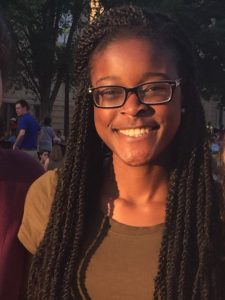![]()

E-mail: balamene@nd.edu
Language: French
Location of Study: Tours, France
Program of Study: L’Institut de Touraine
Sponsors: Nanovic Institute for European Studies, CSLC, College of Arts and Letters
Blog URL: http://sites.nd.edu/sla2018/author/balamene/
![]()
A brief personal bio:
I am a Sophomore from Dallas, Texas, double majoring in both Neuroscience and Political Science. I am currently involved on campus as co-Vice President of African Student Association, and I am a Diversity Ambassador through the Multicultural Student Programs and Services. My interests of Neuroscience and International Affairs have prompted me to pursue a path of multiculturalism–attempting to understand a plethora of things ranging from diverse political and religious beliefs, in addition to cultural practices. My recently-acquired interest in the French language has led me to this moment here–where I will be attending L’Institut de Touraine in Tours, France.
Why this summer language abroad opportunity is important to me:
I initially found the French language to be quite difficult. I struggled through my courses as I attempted to find time amongst all the Biology readings and Chemistry problems that awaited me each night. It was not until the first semester of my Sophomore year that I truly committed myself to the language. I realized that my knowledge of the French language would open up opportunities I had never considered. Being a Political Science major, I was not just interested in politics, but I was interested in West Africa, a region comprised of mainly Francophone countries. I knew that I would one day want to pursue something in international affairs, interacting with those living abroad in these countries. Despite English being the lingua franca in many areas, I want to be able to establish some level of trust with the people I meet. Rather than attempting to navigate my way through these prospective interactions with the use of the English language, I want to be able to use French to indicate my willingness to become familiar with the people who inhabit these areas. In turn, the SLA grant is providing me with the ability to continue my language acquisition in a place where I can also be immersed in the culture, learning about the history and potentially how the culture has manifested itself in other places such as North and West Africa or vice versa.
What I hope to achieve as a result of this summer study abroad experience:
It has been a semester since I have taken my last French course, and quite frankly, I have forgotten a lot. By the end of my summer study abroad experience, I hope that I will have retrieved everything that I have previously learned, while building upon the knowledge I already have of the French language. I hope to have a greater understanding of French culture–because I am curious as to whether it is dynamic as I perceive it to be. With the amount of individuals who immigrate to France, I want to learn about these individuals. I want to learn about who constitutes French society, but I also want this experience to be one that allows me to push past my areas of comfort. Being at Notre Dame has allowed me to do this in some ways, but it’s easy to become complacent. I hope to challenge myself whilst abroad–both mentally, in my interactions with others, and academically, as I try to regain all my former skills of the French language and apply them in conversation with others when discussing art, politics, music, etc.
My specific learning goals for language and intercultural learning this summer:
1. At the end of the summer, I will be able to interact with many individuals of the French citizenry–even those who have come from areas such as Algeria and the Congo whose dialects of the French language are slightly different.
2. At the end of the summer, I will be able to speak better than when I first arrived in France. I will be able to speak the language better than I can read or write–as these currently remain my strongest areas.
3. At the end of the summer, I will be able to use not only formal French but French slang as well, being able to communicate proficiently when amongst locals and when in school.
4. At the end of the summer, I will be able to read many French texts with full proficiency.
5. At the end of the summer, I will have more confidence in navigating my ways through Francophone areas–being able to easily use any mode of transport without having to rely upon my English to help me.